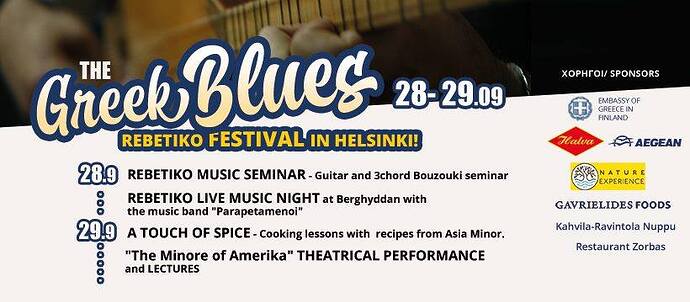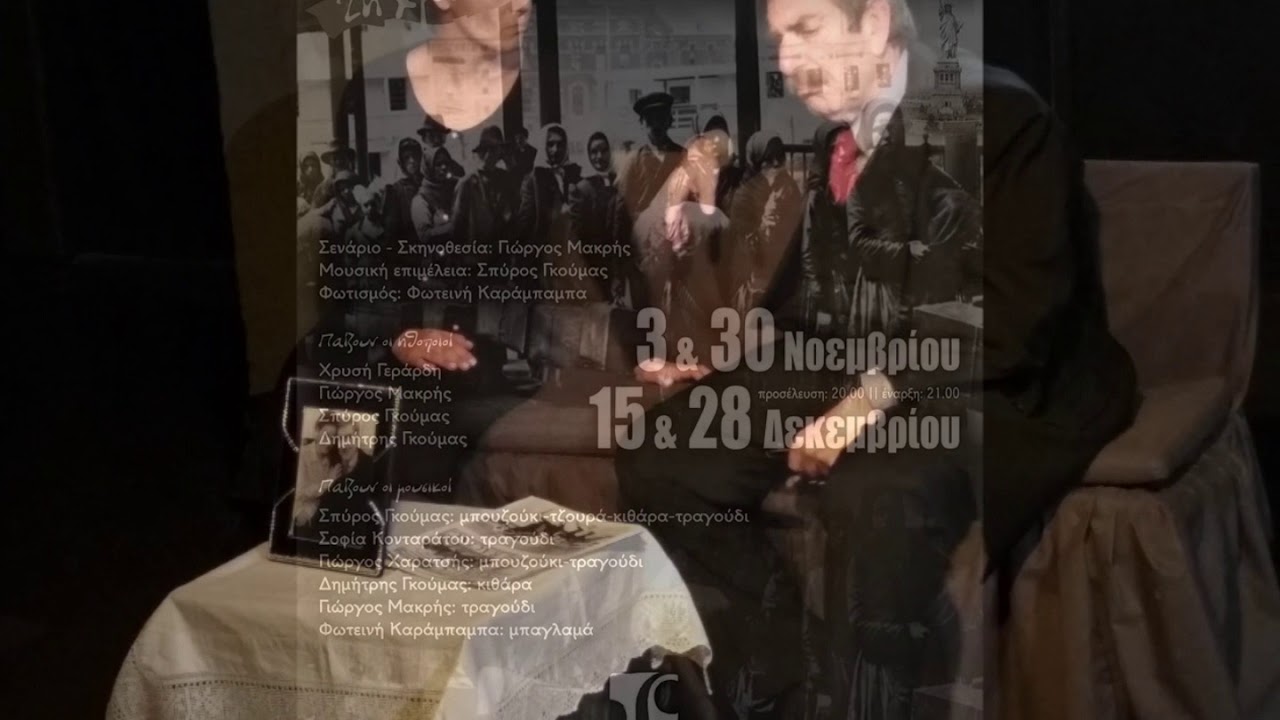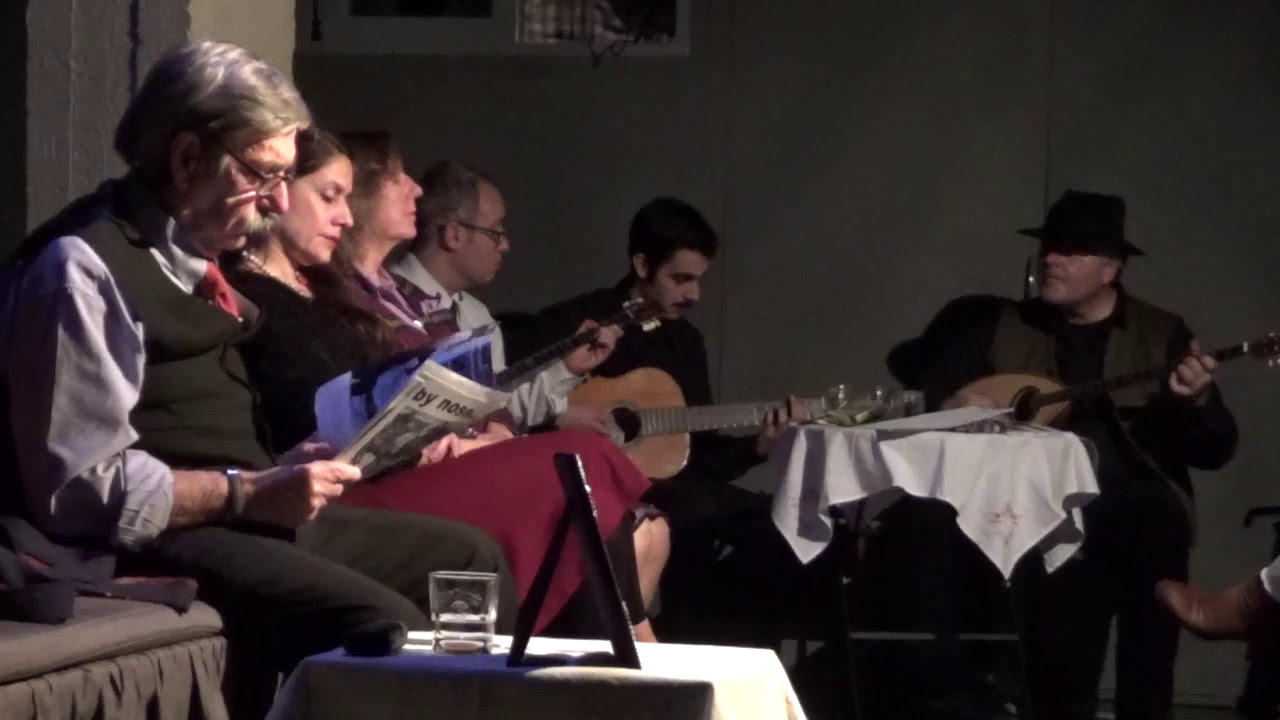Γεια χαρά σε όλους!
Θα ήθελα να συμπληρώσω το πρόγραμμα των διαλέξεων αναλυτικά που θεωρώ ότι στέκονται σε ύψος και πνεύμα που ξεπερνά κατά πολύ τον ‘εμπορικό’ τίτλο που δόθηκε στο φεστιβάλ…:
Lectures schedule (29.9.2019)
at Helsingin Suomalainen Yhteiskoulu (Isonnevantie 8, 00320 Helsinki) @ 17.00-18.30.
-
Risto Pekka Pennanen (University of Tampere) and Eero Heimolinna (Helsinki) : "Laying Eggs of Columbus?: The Etymology and Contexts of the Word ‘Rebetiko’”
-
George Makris (Parapetamenoi ensemble): “A short history of rebetiko songs, its recognition by UNESCO and its current status in the music activities of Greece”.
-
Spiros Delegos: musician, ethnomusicologist [https://uoa.academia.edu/SpirosDelegos]: “‘Rebetiko’: Musicο-Cultural Trajectories within the Eastern Mediterranean and the Balkans”.
Speaker’s CVs:
Risto Pekka Pennanen (Tampere University / Sibelius Academy, Finland)
Risto Pekka Pennanen – musicologist and historian of ideas specialising in the Balkans and the Austro-Hungarian Empire – holds a title of docent in ethnomusicology at Tampere University, Finland. Pennanen received his PhD from University of Tampere (Westernisation and Modernisation in Greek Popular Music, 1999) and has been an Alexander von Humboldt Research Fellow at the Department of Musicology at Georg-August-University in Göttingen, Germany, a research associate at the School of Oriental and African Studies (SOAS), University of London, and a research fellow at Helsinki Collegium for Advanced Studies. Currently he is a visiting research fellow at the Uniarts Helsinki’s History Forum (Sibelius Academy). He has published over 50 peer-reviewed articles on various musical styles, especially those of Greece, Bulgaria and Bosnia-Herzegovina, and on discography, recording industry, organology, soundscape and the canons of music history. His current research projects are Music, Musicians, Soundscape and Colonial Policies in Habsburg Bosnia-Herzegovina, 1878–1918 and Control and Tax: The Licensing and Taxing Systems of Music and Musicians in late Habsburg Prague, 1894–1918.
Eero Heimolinna: Oikeustieteen kandidaatti
Neuvottelupäällikkö
Isännöitsijä
Negora Oy: toimitusjohtaja
Ateenaninstituutin ystävien pj 2012–14
Suomen Parthenon marmorien palautuskomitean sihteeri 2011–
Soittaa rebetika-musiikkia yhtyeessä Kompania Pentara
Filhelleeni
George Makris (guitar, singer) born 1948 in Lesvos (Aegean island). He is a graduate from Pantion University (political science). He worked for a master degree 1976-1978 (International Relation) in New York University (NYU) NY, USA and attained his PhD from Aristotelian University of Thessalonica (Social Demography) in 1996. He split his work life between the National Statistical Service of Greece and the General Secretariat for Youth of Greece (state bodies).
During the dictatorship of 1967-1974 he connected with composers, musicians and singers of the musical trend of “new wave”. He is a self-educated guitar player. From 1997 until 2000 he was student of the Ecclesiastic music of Simon Karas organization for the “Distribution of national music” and member of the chorus. From 2001 until 2006 was student of the conservatoire “musical Horizon” studying ecclesiastical music with the unique and excellent musician Panagiotis Maroulis. Member of the Byzantine choir “Protopsalton and Lambadarion”. In 2001 with Photini Karababa, Giannis Koutsavlis, Kostas Spyrou and Xrysanthi Cronidou created the “parapetamenoi”. In 2009 with Photini Karababa established the International seminar-meeting in Skyros and from 2010 has been collaborated with the excellent musician and instructor Spiros Goumas for the rebetiko seminar in Skyros, various music performances and music-theatrical plays in Greece and abroad.
**Spiros Delegos short CV:
Spiros Delegos holds a Master’s degree in the field ‘Ethnomusicology and Cultural Anthropology’ from the University of Athens and a Bachelor’s degree in Mathematics from the University of Patras. He has studied traditional Greek music and lavta at the Municipal Conservatory of Patras, theory of ‘Western Classical Music’ at the Philharmonic Foundation Conservatory of Patras, ‘Eastern’ Music and classical mandolin privately. Furthermore, he has got an excellent knowledge of folklore guitar and the Greek three course bouzouki and baglama. As a musician, he has appeared at numerous musical venues, live concerts and festivals and has composed music for theatre. He has participated with (ethno)musicology papers in several conferences (IMS, ICTM, etc.). He teaches in the Philharmonic Foundation Conservatory of Patras and is responsible for the ‘Urban Popular Music Orchestra’.
SUMMARY OF LECTURES
Risto Pekka Pennanen (TaU/Sibelius Academy) & Eero Heimolinna (Helsinki)
’Laying Eggs of Columbus? The Etymology and Contexts of the Word ‘Rebetiko’
Various scholars and rebetiko enthusiasts have suggested numerous possibilities for origins of the word ‘rebetiko’ – a baker’s dozen and beyond. None of them, however, is watertight. This presentation furnishes an overview of the previous etymological hypotheses and suggests a new, auspicious one. Furthermore, the early history of the term ‘rebetiko’ is of distinct interest, recording industry being instrumental in the usage and spread of the word; the motivation behind the usage was certainly commercial. That said, it remains uncertain what the buyers supposed to have purchased when selecting a recording with the characterisation ‘rebetiko’. As axiomatic from record labels, categorisations in record catalogues and song lyrics, the contextual meaning of the term remained nebulous in the initial and mid-stages of the history of Greek recorded music.
Spiros Delegos: musician-ethnomusicologist
- Rebetiko’: Musicο-Cultural Trajectories within the Eastern Mediterranean and the Balkans
The current talk attempts to trace briefly the musicο-cultural trajectories within the powerful and cosmopolitan urban network of the eastern Mediterranean and the Balkans, which lead to the formulation of Rebetiko musical culture.
During the interwar period, Rebetiko was one of the most known musical genres of Greek urban popular music. The latter, as an umbrella term, embraces a plethora of instrumental tunes and songs of mixed origin and rich in style and morphology; these flourished in the large urban centres of the greater Greek area and the Ottoman Empire (Athens, Piraeus, Istanbul, Smyrna, Salonika, etc.) from the 19th century onwards.
Nonetheless, it should be clarified that ‘Rebetiko’ is quite a broad and obscure term; this is so not just from a scholar perspective, but from the several different views in everyday life regarding its content and the unclear time of its birth and demise, too.


